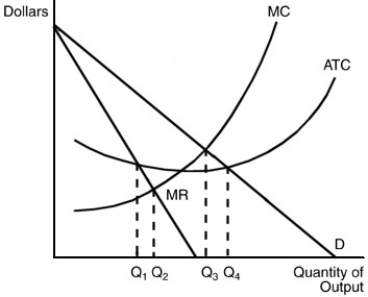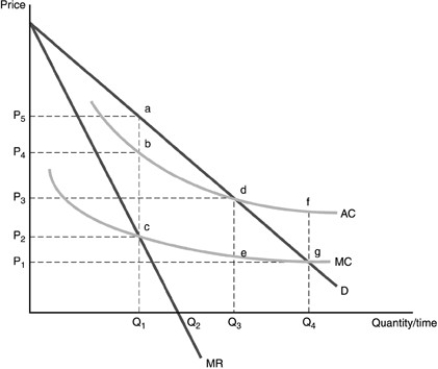Exam 27: Regulation and Antitrust Policy in a Globalized Economy
Exam 1: The Nature of Economics347 Questions
Exam 2: Scarcity and the World of Trade-Offs411 Questions
Exam 3: Demand and Supply448 Questions
Exam 4: Extensions of Demand and Supply Analysis399 Questions
Exam 5: Public Spending and Public Choice359 Questions
Exam 6: Funding the Public Sector202 Questions
Exam 19: Demand and Supply Elasticity413 Questions
Exam 20: Consumer Choice457 Questions
Exam 21: Rents, Profits, and the Financial Environment of Business445 Questions
Exam 22: The Firm: Cost and Output Determination387 Questions
Exam 23: Perfect Competition431 Questions
Exam 24: Monopoly386 Questions
Exam 25: Monopolistic Competition309 Questions
Exam 26: Oligopoly and Strategic Behavior302 Questions
Exam 27: Regulation and Antitrust Policy in a Globalized Economy309 Questions
Exam 28: The Labor Market: Demand, Supply and Outsourcing374 Questions
Exam 29: Unions and Labor Market Monopoly Power316 Questions
Exam 30: Income, Poverty, and Health Care302 Questions
Exam 31: Environmental Economics299 Questions
Exam 32: Comparative Advantage and the Open Economy313 Questions
Exam 33: Exchange Rates and the Balance of Payments300 Questions
Select questions type
The statement "Every contract, combination in the form of a trust or otherwise, or conspiracy, in restraint of trade or commerce . . ." is found in the
(Multiple Choice)
4.7/5  (42)
(42)
All of the following are exempt from antitrust enforcement EXCEPT
(Multiple Choice)
4.9/5  (45)
(45)
According to the capture hypothesis, it appears that regulators eventually end up
(Multiple Choice)
4.9/5  (40)
(40)
In the above figure, if this natural monopolist were regulated and allowed to earn a "fair" rate of return, it would produce
(Multiple Choice)
4.9/5  (35)
(35)
Discuss the important provisions of the Sherman Antitrust Act of 1890.
(Essay)
4.8/5  (34)
(34)
The act of selling an item in slightly altered forms at different prices and to different groups of consumers is known as
(Multiple Choice)
4.9/5  (34)
(34)
Regulation that is based on allowing prices to reflect only the actual operating cost of production is known as
(Multiple Choice)
4.9/5  (38)
(38)
Which of the following is concerned with social regulation?
(Multiple Choice)
4.7/5  (41)
(41)
Economists who think the capture theory explains regulatory behavior will support their claims by noting that
(Multiple Choice)
4.9/5  (29)
(29)
Regarding the costs of regulation, which is a FALSE statement?
(Multiple Choice)
4.7/5  (39)
(39)
 -Why do government regulators not enforce marginal cost pricing for natural monopolies? What are the common regulatory solutions?
-Why do government regulators not enforce marginal cost pricing for natural monopolies? What are the common regulatory solutions?
(Essay)
4.9/5  (33)
(33)
Which of the following will NOT be true if the antitrust laws are successful?
(Multiple Choice)
4.8/5  (31)
(31)
 -Refer to the above figure. An unregulated natural monopolist's profits will be
-Refer to the above figure. An unregulated natural monopolist's profits will be
(Multiple Choice)
4.8/5  (41)
(41)
Behavior on the part of the firm that allows it to comply with the letter of the law but violate the spirit reducing the law's effect is
(Multiple Choice)
4.8/5  (31)
(31)
Showing 121 - 140 of 309
Filters
- Essay(0)
- Multiple Choice(0)
- Short Answer(0)
- True False(0)
- Matching(0)